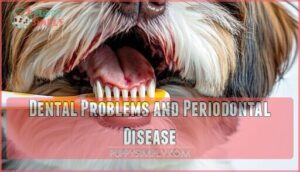This site is supported by our readers. We may earn a commission, at no cost to you, if you purchase through links.

These sturdy little companions are like that reliable friend who sticks around longer than expected.
Their lifespan depends on genetics, diet, exercise, and regular vet checkups.
While Shih Tzus are generally healthy, they’re prone to breathing issues, joint problems, and eye conditions that can affect longevity.
You’ll want to watch their weight, keep up with grooming, and stay on top of dental care.
The good news? Simple daily habits can substantially impact how long your furry friend stays healthy and happy.
Table Of Contents
- Key Takeaways
- Shih Tzu Lifespan Overview
- How Long Do Shih Tzus Live
- Common Health Issues
- Care and Longevity Tips
- Maximizing Shih Tzu Lifespan
- Frequently Asked Questions (FAQs)
- What is the main cause of death in Shih Tzus?
- How long do indoor Shih Tzus live?
- What are the end of life symptoms of a Shih Tzu?
- What is considered old for a Shih Tzu?
- Should I get my Shih Tzu spayed/neutered?
- How can I tell if my Shih Tzu is reaching the end of its lifespan?
- What are the common characteristics of Shih Tzus?
- What are the most common health issues in Shih Tzus?
- Do male or female Shih Tzus live longer?
- How does spaying/neutering affect Shih Tzu lifespan?
- Conclusion
Key Takeaways
- You can expect your Shih Tzu to live 10-18 years, with most reaching 13-16 years when you provide quality care, proper nutrition, and regular veterinary checkups.
- You’ll need to watch for breed-specific health issues like breathing problems, joint issues, eye conditions, and dental disease that can significantly impact your dog’s lifespan if left untreated.
- You can extend your Shih Tzu’s life by maintaining a balanced diet, providing gentle daily exercise, keeping up with regular grooming, and creating a safe, stress-free environment.
- You should schedule regular vet visits for early detection of health problems, stay current with vaccinations, and practice preventive care like daily dental hygiene to maximize your dog’s longevity.
Shih Tzu Lifespan Overview
You can expect your Shih Tzu to live between 10 and 16 years, with many reaching their early teens when given proper care.
Several key factors influence their longevity, including genetics, nutrition, regular veterinary care, and maintaining a healthy lifestyle that keeps them active and engaged.
Average Lifespan Range
Your Shih Tzu’s average lifespan typically ranges between 10 to 16 years, with most reaching around 13 years.
This shih tzu life expectancy places them among longer-lived small breeds.
Statistical analysis shows global averages hover near 12-14 years, though some exceptional pups live into their late teens.
The average shih tzu age varies slightly across breed variations, but you can expect over a decade of companionship.
Factors Influencing Longevity
Your Shih Tzu’s lifespan depends on several interconnected factors that you can influence.
Genetic predisposition sets the foundation, but environmental impact and lifestyle choices play equally important roles.
Proper shih tzu diet, preventative measures, and holistic wellness approaches substantially extend shih tzu life expectancy.
Understanding these factors helps you address potential shih tzu health problems before they impact your dog’s longevity.
A balanced diet is essential for a longer life.
Genetics and Breed Line
Your Shih Tzu’s genetics substantially impact their lifespan potential.
**Your Shih Tzu’s genes hold the blueprint for their longevity journey.
Responsible breeders conduct genetic screening to minimize inherited conditions, while poor breeding practices can introduce health problems that shorten life expectancy.
The breed’s average lifespan typically ranges from 10 to 16 years.
Consider these genetic factors when choosing your puppy:
- Breeder reputation and health testing protocols
- Lineage health history of parent dogs
- Genetic predispositions to common breed conditions
- Inherited conditions screening results
- Canine genetics knowledge and breeding practices
Diet and Nutrition
Beyond genetic factors, what you feed your Shih Tzu directly impacts their lifespan.
A balanced diet with proper portion control can add years to your dog’s life.
Quality nutrition supports everything from joint health to cognitive function, making it a cornerstone of longevity.
| Nutrition Factor | Impact on Shih Tzu Lifespan |
|---|---|
| Balanced Diet | Supports organ function and immunity |
| Portion Control | Prevents obesity-related health issues |
| Hydration Needs | Maintains kidney and digestive health |
| Senior Nutrition | Adapts to changing metabolic needs |
| Toxic Foods | Avoiding these prevents poisoning risks |
How Long Do Shih Tzus Live
When you’re considering adding a Shih Tzu to your family, understanding their Shih Tzu lifespan becomes essential for planning ahead. These adorable companions typically live between 10 to 16 years, with most reaching an average Shih Tzu age of 13 years.
However, extending Shih Tzu life through proper care can push some into their late teens. The record lifespans tell an impressive story – Smokey from Florida lived an extraordinary 23 years, though such cases remain extremely rare.
In breed comparisons, Shih Tzus actually outlive many larger dogs, thanks to their small size advantage. Global averages consistently show this breed performing well in longevity studies.
Future trends in veterinary care and ethical breeding practices continue improving these numbers. Here’s what you can expect:
- Most Shih Tzus celebrate their 10th birthday easily
- Quality breeding lines often produce longer-lived dogs
- Exceptional cases reach 18-20 years with dedicated care
- Small breed genetics naturally support extended lifespans
- Modern veterinary advances keep pushing longevity boundaries
Common Health Issues
While Shih Tzus are generally healthy dogs, they’re prone to specific health conditions that can impact their quality of life and longevity.
Understanding these common issues helps you recognize early warning signs and work with your vet to keep your furry companion healthy for years to come, which is crucial for their quality of life and overall longevity.
Joint Issues and Hip Dysplasia
Hip dysplasia affects your Shih Tzu’s mobility when hip joints don’t fit properly.
Most dogs show Hip Dysplasia Symptoms between 6-12 months, including limping and difficulty standing. Joint Supplements and Exercise Modifications help manage discomfort.
Patellar Luxation Treatment may require surgery for severe cases. Genetic factors can play a substantial role in the development of this condition.
Early diagnosis through X-rays prevents long-term joint issues affecting your shih tzu lifespan.
| Symptom | Mild Cases | Severe Cases |
|---|---|---|
| Limping | Occasional | Constant |
| Mobility | Slightly reduced | Noticeably limited |
| Pain Level | Manageable | Requires medication |
| Treatment | Exercise modifications | Surgery needed |
Breathing Problems and Collapsed Trachea
Breathing troubles can seriously impact your shih tzu lifespan. These short-faced dogs face brachycephalic concerns like collapsed trachea, where weakened cartilage rings flatten and obstruct airflow.
Environmental factors like smoke worsen symptoms. Early detection helps – watch for harsh, persistent coughing.
Harness importance can’t be overstated since collar pressure triggers episodes. Specialized pet products may help manage the condition.
Surgical options exist for severe cases requiring immediate intervention.
Eye Problems and Proptosis
Your Shih Tzu’s protruding eyes face constant danger from injuries that can cause proptosis – when eyeballs literally pop from their sockets.
This terrifying condition demands immediate surgical intervention to prevent permanent blindness.
Watch for these warning signs:
- Excessive blinking or squinting
- Eye rubbing against furniture
- Cloudiness or discharge
Early detection saves sight and prevents devastating vision loss through proper post-op care.
Regular vet checkups are important, as puppy eyes development relies on key milestones.
Ear Infections and Allergies
Your Shih Tzu’s floppy ears create the perfect breeding ground for infections, especially when allergies strike.
Allergy symptoms like excessive scratching and head shaking often lead to ear problems that can impact your dog’s overall Shih Tzu lifespan.
Regular cleaning techniques and monitoring dietary impact help with infection prevention.
For routine maintenance, consider using a specialized ear cleaner.
When veterinary treatments become necessary, don’t delay—ear infections worsen quickly in this breed.
Dental Problems and Periodontal Disease
While ear troubles can be bothersome, dental problems pose an even greater threat to your Shih Tzu’s health and longevity.
Poor dental hygiene leads to periodontal disease, affecting 9.5% of the breed. Their small mouths and crowded teeth create perfect conditions for plaque buildup, bad breath, and eventual tooth loss if left untreated.
Key Signs of Dental Problems:
- Persistent bad breath that doesn’t improve after eating or drinking
- Red, swollen gums indicating early gum disease development
- Yellow or brown tartar buildup along the gum line on teeth
- Loose or missing teeth from advanced periodontal disease progression
- Difficulty eating or pawing at the mouth during meals
Professional cleaning and daily brushing prevent these shih tzu common diseases from affecting your pet’s quality of life. Regular brushing requires a specialized dog toothbrush designed for their unique dental needs.
Care and Longevity Tips
You can substantially extend your Shih Tzu’s life by focusing on five key areas: proper nutrition, regular exercise, consistent veterinary care, a safe environment, and daily grooming routines.
These simple but essential practices work together to prevent common health issues and help your furry companion reach their full lifespan potential of 10 to 16 years, with regular exercise being a crucial part of this.
Balanced Diet and Nutrition
After addressing health concerns, proper nutrition becomes your secret weapon for extending your Shih Tzu’s lifespan.
The right balanced diet delivers ideal nutrients that fuel longevity, while portion control prevents obesity-related issues.
Senior diets require adjustments as your pup ages, and knowing toxic foods keeps them safe.
| Nutrition Factor | Benefit | Implementation |
|---|---|---|
| Ideal Nutrients | Supports organ function | High-quality dog food with protein, vitamins |
| Portion Control | Prevents obesity | Follow feeding guidelines, measure meals |
| Hydration Importance | Maintains kidney health | Fresh water daily, monitor intake |
Regular Exercise and Mental Stimulation
A well-fed Shih Tzu needs more than good food to thrive.
Regular shih tzu exercise doesn’t mean marathon runs—gentle walks and playtime activities work perfectly. Mental challenges through puzzle toys and training benefits both mind and body, directly impacting Shih Tzu lifespan. Think of exercise as your dog’s daily vitamin for longevity.
- Gentle 15-minute walks that make your pup’s tail wag with pure joy
- Interactive puzzle toys that turn treat time into brain-boosting adventures
- Basic agility exercises using household items for fun obstacle courses
- Socialization importance through puppy playdates that spark lifelong friendships
Veterinary Care and Preventive Screenings
Regular veterinary care serves as your Shih Tzu’s health insurance policy. Annual checkups enable early detection of potential issues before they become serious problems.
Your veterinarian will establish vaccination protocols and parasite control measures suited to your dog’s needs.
As your Shih Tzu ages, senior screenings become increasingly important for maintaining peak health and extending their lifespan. For senior dogs, consider that biannual wellness checks are often recommended to ensure they receive the best possible care and maintain a high quality of life, which can be considered a part of their overall wellness.
Safe Environment and Lifestyle
Your Shih Tzu’s lifespan depends heavily on toxin removal and injury prevention in their daily environment.
Create secure housing by puppy-proofing dangerous areas and removing harmful plants or chemicals.
Supervised play sessions protect against accidents while supporting mental wellbeing.
A safe, stress-free home directly impacts Shih Tzu longevity, making environmental awareness as important as proper dog diet and nutrition for extending their years.
Regular Grooming and Dental Hygiene
Proper grooming frequency becomes your secret weapon against matting and skin issues that plague this double-coated breed.
Brush daily using gentle techniques to prevent tangles.
Dental care can’t be overlooked—dental disease affects most Shih Tzus by age three.
Weekly brushing paired with professional cleaning and diet impact on oral health will keep those pearly whites sparkling and extend your pup’s lifespan substantially, thanks to good oral health.
Maximizing Shih Tzu Lifespan
You’ve learned about the factors that affect your Shih Tzu’s lifespan, and now it’s time to put that knowledge into action.
The following strategies will help you give your furry companion the best chance at reaching those golden senior years, potentially extending their life well beyond the average 13-year mark, with the goal of helping them live a long and healthy life.
Proper Care and Attention
Your Shih Tzu’s longevity depends on consistent, loving care that addresses their unique needs.
Grooming Importance extends beyond appearance—regular brushing prevents matting and skin issues.
Dental Health requires daily attention since small mouths crowd teeth easily.
Mental Stimulation through puzzle toys keeps minds sharp, while a Safe Environment protects from hazards.
Meeting Emotional Needs through quality time strengthens your bond and overall well-being, which is crucial for Mental Stimulation, Dental Health, and a Safe Environment.
Early Detection of Health Issues
When health issues sneak up quietly, early detection becomes your Shih Tzu’s lifeline.
Owner vigilance paired with regular checkups helps catch problems before they escalate.
Watch for subtle changes in appetite, energy, or behavior—these symptoms often signal underlying concerns.
Genetic screening reveals hereditary risks, while preventative measures and consistent veterinarian visits guarantee your dog’s longevity through proactive shih tzu health tips.
Preventive Care and Maintenance
Prevention beats cure in the case of shih tzu longevity.
Schedule regular veterinarian visits for vaccinations and health screenings. Maintain balanced nutrition through quality diet choices.
Practice dental hygiene with weekly brushing to prevent periodontal disease. Keep a safe environment free from toxins and hazards.
Consistent regular grooming prevents skin issues and matting, supporting your dog’s overall well-being. Factors like genetics can affect average shih tzu lifespan, so responsible breeding is key.
Emotional Engagement and Mental Stimulation
Mental stimulation keeps your Shih Tzu’s mind sharp and supports shih tzu longevity.
Bonding activities like training games strengthen your relationship while reducing boredom.
Puzzle toys challenge their intellect, while socialization benefits include improved confidence and happiness.
Regular emotional engagement through interactive play and new experiences enhances caring for shih tzu efforts, contributing to extending shih tzu life and shih tzu quality life.
Creating a Stress-Free Environment
When life gets chaotic, your Shih Tzu feels it too.
Create a calm environment with consistent routines and gentle handling to minimize stress.
Establish a safe space where they can retreat when overwhelmed.
Use positive reinforcement during socialization to prevent behavioral issues and separation anxiety.
Remember, a peaceful home environment directly impacts your dog’s overall health and longevity.
Frequently Asked Questions (FAQs)
What is the main cause of death in Shih Tzus?
Most Shih Tzus pass away from heart disease, kidney failure, or cancer as they age.
You’ll also see respiratory issues due to their flat faces, plus complications from hip dysplasia affecting their final years.
How long do indoor Shih Tzus live?
Indoor Shih Tzus typically live 12-16 years, often reaching their late teens with proper care.
You’ll find they generally outlive outdoor dogs due to reduced exposure to accidents, diseases, and environmental hazards that can shorten their lifespan, which makes proper care crucial for their well-being.
What are the end of life symptoms of a Shih Tzu?
Recognizing your aging Shih Tzu’s final stage involves watching for decreased appetite, difficulty breathing, loss of mobility, confusion, withdrawal from family activities, and sleeping more frequently than usual.
What is considered old for a Shih Tzu?
Your Shih Tzu enters their golden years around 7-9 years old, though they’re typically considered seniors by age 9-
You’ll notice slower movements, graying fur, and increased napping as natural aging signs appear.
Should I get my Shih Tzu spayed/neutered?
Preventing unwanted surprises is wise—yes, you should spay or neuter your Shih Tzu.
This procedure reduces cancer risks, eliminates heat cycles, and decreases behavioral issues.
Schedule it after puberty for maximum health benefits.
How can I tell if my Shih Tzu is reaching the end of its lifespan?
Watch for slower movements, increased napping, cloudy eyes, graying fur around the muzzle, dental issues, eating difficulties, confusion, or restlessness.
These signs typically appear when your dog reaches 7-9 years old, signaling senior status, and may include issues such as dental problems.
What are the common characteristics of Shih Tzus?
What makes these little lions so special?
Your Shih Tzu’s got a flowing double coat, flat face, and big expressive eyes.
They’re friendly, affectionate companions who love being lap dogs but can be surprisingly stubborn during training sessions.
What are the most common health issues in Shih Tzus?
Your Shih Tzu faces several health challenges you’ll want to watch for.
Breathing problems, eye issues, hip dysplasia, and dental disease top the list.
Their flat faces and protruding eyes make them particularly vulnerable.
Do male or female Shih Tzus live longer?
There’s no significant difference in lifespan between male and female Shih Tzus.
Both typically live 10-16 years.
Individual factors like genetics, diet, healthcare, and lifestyle matter more than gender when determining your dog’s longevity.
How does spaying/neutering affect Shih Tzu lifespan?
Spaying or neutering your Shih Tzu can extend their lifespan by reducing risks of reproductive cancers, pyometra, and certain behavioral issues.
It’s best done after puberty to support proper development while gaining health benefits.
This procedure can help reduce risks, making it a valuable consideration for Shih Tzu owners.
Conclusion
Like a well-tended garden that flourishes with proper care, your Shih Tzu’s lifespan depends entirely on the attention you provide.
Understanding how long do Shih Tzu live—typically 10 to 18 years—gives you the roadmap for maximizing those precious years together.
You’ve got the tools: quality nutrition, regular vet visits, proper grooming, and daily exercise.
Stay proactive about health screenings, maintain their weight, and watch for breed-specific issues.
Your dedication today determines tomorrow’s adventures with your loyal companion.
- https://shihtzutime.com/shih-tzu-life-span/
- https://www.upi.com/Odd_News/2009/06/02/Smokey-the-Shih-Tzu-23-years-old/79711243975257/
- https://www.akc.org/expert-advice/health/spaying-and-neutering-your-dog-faqs/
- https://www.oldest.org/animals/shih-tzus/
- https://vetspecialists.co.uk/fact-sheets-post/imha-immune-mediated-haemolytic-anaemia-fact-sheet/


















